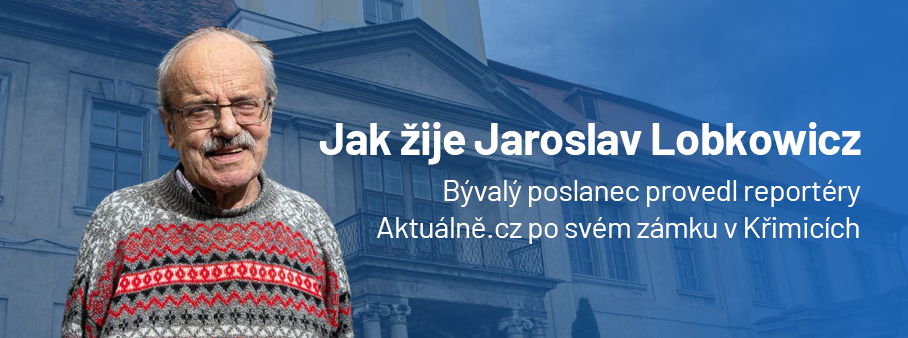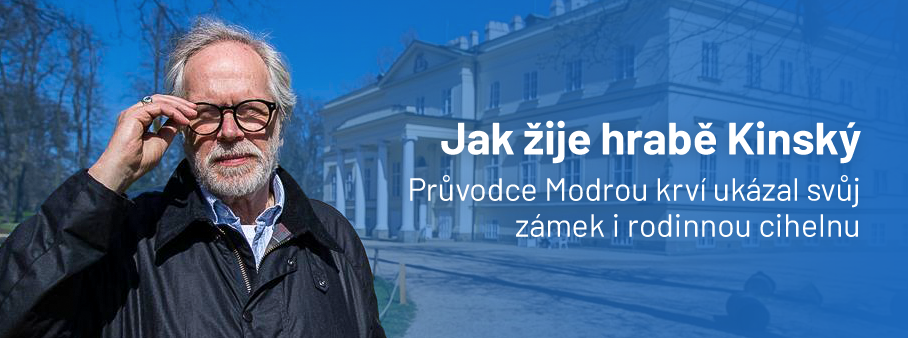Tomasz Chernin sits on a white sofa in the living room of his castle in Tymokuri, not far from Potibrody. Where most people have a TV in their living room, he watches the fireplace. Above it hangs a historical painting and next to it portraits of Chernin’s four children. It’s a windy November day and Melusina is crying across the room.
Chernins
The Chernins have been influential in Czech politics since the 12th century. They derive their origin from the Dreslavic family, who were castellans of Pilsen Castle. The first preserved written reference to the family dates from 1193, when Cernin was appointed supreme chamberlain of the Kingdom of Bohemia.
The fairy-tale illusion is disrupted by modern objects that demonstrate the family’s continued use of the salon. An old Nokia is on the windowsill, the popular board game Tens is on the coffee table, and an audio system is in the corner of the room. A coffee table is like a sofa from a chain, it is not a piece of furniture with historical value.
“Whoever imagines that living in a castle in the 21st century is some kind of romance is wrong. It’s some kind of madness. We have the feeling that when the wind blows, it also blows inside,” the most famous representative of an ancient and branched noble family crosses his legs.
“I’ve been saying for a long time that I’m a craftsman, a stoker, a garbageman, a park technician and a caretaker,” he says, sipping a cup of coffee and lighting a cigarette. He admits that housing isn’t exactly practical, but doesn’t want to live anywhere else because of the family legacy.
Arriving in a village with less than a thousand inhabitants, you will not even notice the baroque castle. It is overshadowed by the huge concrete wall of the former barracks, which was insensibly built on the land opposite during the previous regime.
Video: Tomasz Chernin in his castle Taimoguri
I blamed my parents for not settling down
The Communists confiscated the property of the Chernins, who used the castle as a warehouse. It was restored after the Revolution in the Restoration by the now-deceased father Theobald (also known as Debold). Tomas Chernin spent his early childhood in a panel house in Sodo, near Karlovy Vary. After their younger brother Tebold was born, the two-room apartment was no longer enough for them, and they moved to a house outside the town of Nejtek, in what he describes as “hard ore hills.”
Selected Ancestral Seats
Other important places associated with the Chernin family: Andalska Hora (Karlovary), Kosmoňi (Mladopolslav), Kost (Žižgen), Nepilovy (Pilsen), Struzna (Carlovary), Šťáhlavy (Pilsen), Vinos (Prague).
Today only Dymokury and Hlušice belong to the Czernin family
“When I was young, I blamed my parents a lot for not immigrating. I asked why I had to live in communism,” he recalled. He graduated from the Faculty of Civil Engineering at CTU and in 1990 he married and moved to Vienna with his wife Ursula. In the same year, Tymogers returned to his family.
Two years later, one January midnight, Tomas Chernin’s phone rang. His father said he was needed in Timokuri to help him get back and start the economy. It was faster than Chernin, thirty years old at the time, expected. But he wanted to go to the family home. His grandfather, Rudolf Deboldt, had a great influence on him. It was from him that the Taimokur fortress was captured first by the Nazis, and then by the Communists. He remembered him till the end of his life.
“Grandfather died in Vienna, he was not happy there, he had nothing there, he lived on the support of his relatives. He lost his property, freedom, homeland and to some extent his family. All his life he kept losing something. I want to experience it differently and one day I will return to Taimokur. I always made up my mind,” Chernin recounts.
“Grandpa eventually came here too, his ashes came in the mail and he was buried here. Before I was in a chest or a cell I told myself I would be happy every day I returned,” she adds, and appreciates in retrospect that her parents didn’t go abroad.
There is nothing interesting about the fort
At first they lived in a small house in the premises of a former soda factory in Timokuri. With more work to be done, they moved to the fort after six years. They basically moved into a construction site. Today, they use the entire apartment, three quarters as rooms and one quarter as offices. Not accessible to the public.
“There’s nothing very interesting to see here. When the Germans created a database of valuable works, I saw a report that they took to the Reich after the victory. It says there’s nothing interesting here,” says the sixty-one-year-old senator. He points out that they bought a lot of furniture at Ikea and didn’t worry too much about whether it would fit in a baroque castle.
Much of the fort was reconstructed by his father at his own expense. The biggest investment of the current head of the family is the boiler room. They employ a cleaning lady and an administrator who mainly oversees the heating. Together with the administrator and his sons, Chernin takes care of the large land around the building.
The current form of the mansion dates from the end of the 18th century, and it fell to the Chernin family in 1833 thanks to the marriage of Count Odager Chernin from Südenise with Rosina Gavrianiova, the widow of Joseph Coloreda. His property includes 1,560 hectares of forests, 170 hectares of ponds and 1,000 hectares of fields. Czernin is also the owner of companies Dymokury and Czernin Agro. The first provides agricultural services, engaged in fish and hunting and breeding and sales, while the second processes beef and pork.

The coat of arms changed over the centuries, but the right half was always red. The left half consists of horizontal blue and white stripes. After the rise of the family, the initials of the Habsburg kings Rudolph, Matthias and Ferdinand II were added to the light lines. For the last mentioned, the Chernins were given the title. Later in honor of King Ferdinand III. They added his initials in the middle of the coat of arms.
He likes to stay in the forest. The entire corridor on the first floor is hung with hunting trophies. “The forest is an example of conservatism. We have no merit or benefit from it, but what we put into it, what we grow in it, we have nothing in return. Only those who come after us will use it,” he thinks.
The corridor leads to the entrance of the brightly colored chapel. They only use it on special occasions. They go to nearby churches for regular Sunday worship. Like other noble families, the Chernins were Catholics.
From the first floor, he leads reporters through the boiler room and across the courtyard, the center of which is dominated by his mother Balixena’s rose bushes, back into a parlor that resembles a living room. Behind that is the dining room with a table that seats nine and a wooden sideboard. Here, one feels as if one is already in a castle. However, Chernin is not affected by grand dining. He prefers to eat directly in the kitchen, instead of a plate, a cutting board is enough for him.
Grandfather volunteered to protect the motherland
One of Chernin’s sons will probably take over the castle one day. She has four children in total. The elder Zuzana Maria works in the diplomatic service in Brussels, and the second-born Anna Maria is an artist in Vienna. The younger Wolfgang or Maximilian would most likely take care of the hereditary farm.
Tomáš Czernin is the Vice President of TOP 09, Vice President of the Senate and representative of Dymokur. The Chernins influenced political events for centuries. In 1938 and 1939, he was prompted to re-enter politics by his grandfather, who, along with other representatives of noble families, stood for the defense of the motherland.
“My grandfather was not a politician, but when the Republic was threatened, he was one of those who met with President Benes to support him in maintaining Czechoslovakia’s historic borders, i.e. not surrendering to Nazi Germany. They expressed their solidarity with President Hacha by declaring their loyalty to the Czech nation. They were all placed on the Gestapo list. , so there were complications, but they did a heroic deed,” he recalled.

